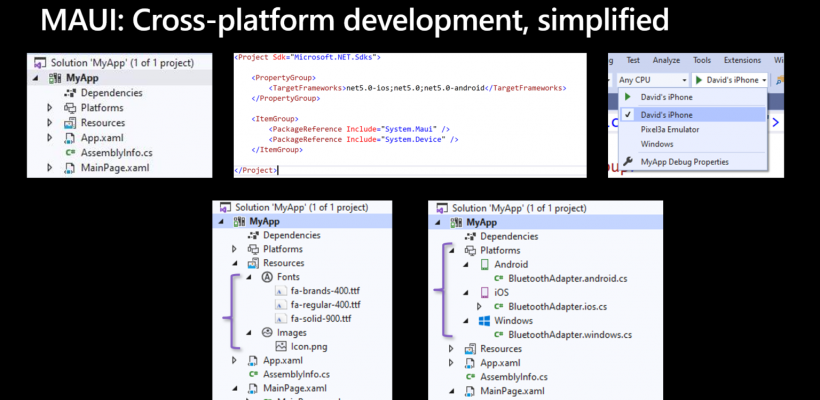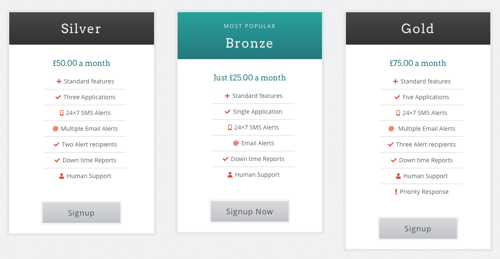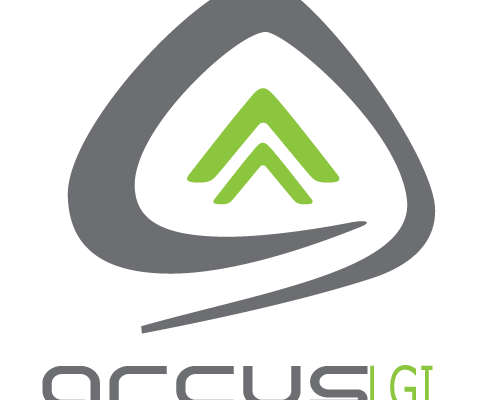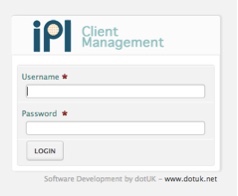Microsoft’s new cross platform software framework – What does it mean to your business?
Yesterday at the Microsoft Build conference they announced MAUI, the roadmap to their new cross platform software, single codebase framework, quoting from their release;
Introducing .NET Multi-platform App UI:
As we consider what building device applications will look like in a unified .NET, we see many devices across multiple platforms used, from Android and iOS to Windows and macOS. To address this need we are excited to announce a new first-class UI framework for doing just that: .NET Multi-platform App UI, affectionately call .NET MAUI.
This means a lot to us as developers, but what does it mean to you as business owners, decision makers, and end users? To your business?
App languages – how they differ
All computer software (apps are just software applications, all the same really) is traditionally designed to run on it’s intended platform, the Web, Windows PC, Apple Mac, iPhone, Android etc – an app written for one platform will traditionally be written in the language that platform expects, all these platforms have different native languages, ie an app written for one won’t work on another.
In layman’s terms, if you learn French it will stand you in great stead on a holiday to France, but pop next door to Spain and you’re stuck. Unless you learn Spanish too, but that’s twice as much work.
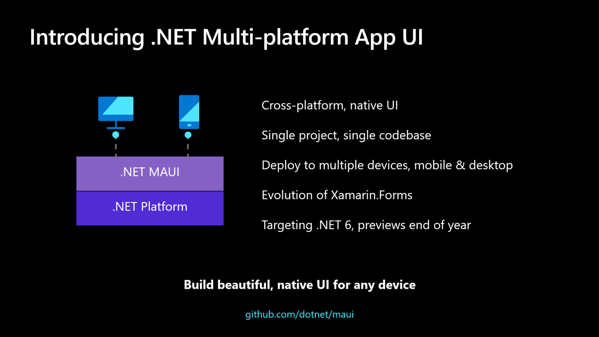
Multiple App Platforms
Which is where us developers come in, most developers speak more than one language, but certainly not all, and in the past you had to be careful that the language choice the developer was making for your project was because it was the right one for your needs. Not because it was the one they knew. But as IT expanded, people started using their own devices, and mobile computing became the norm it stopped being about which platform – Mac vs PC if you will, but which platforms – plural.
So if you ask a developer to create you a mobile app you are probably targeting iPhone and Android, two platforms, two languages (Objective C or Swift, and Java in case you were wondering!) – so that’s actually two apps you need, twice the work, twice the support, twice the cost!!! If only there were some (good – there are bad ways, we don’t do them) way of creating good, native, performant apps on both platforms, from one codebase, one product to support, and only one to pay for – cheaper is better right?
How can Xyroh help?
Well for most cases there is, it’s niche, here at Xyroh we do it, and have spent a lot of time and resources investing in these skills, the platform we use is Xamarin from Microsoft, and in *most* cases, certainly B2B projects it’s perfect – outputting great, custom mobile apps for iPhone, Android, Windows Phone – Tizen even – at good value to your business.
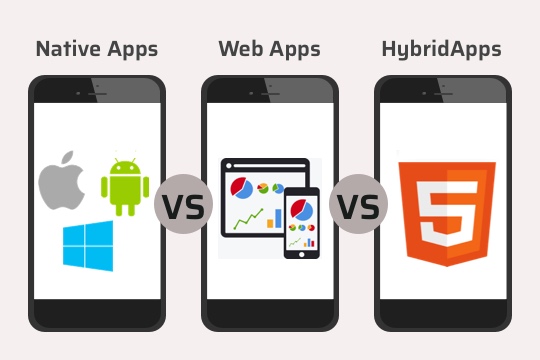
Well that’s what this announcement was about, the next stage. Microsoft’s new MAUI framework will allow us to create line of business apps that run on;
– Android
– iOS (iPhone and iPad)
– Mac OS
– Windows
All from one project, one codebase, one cost – but much more value. So if you have a need for apps, be it a mobile app, a desktop app, or even a web app in your business then we’d love to talk to you.
Related Articles:
– Native App, Hybrid App, or somewhere in between?
– Xamarin Cross Platform Application Development – Book Review
Andy, the founder of Xyroh, is a mobile app developer, specialising in cross platform mobile apps, iphone apps, android apps, as well as web applications and desktop software for business clients across the North East – feel free to contact him to engage his services
Industrial Programming Case Study – Glasgow Watersports
Prior to Xyroh, Andy was the founder of dotUK (A software development firm based out of Yarm and Stockton on Tees here in the North East), again specialising as a developer in mobile apps, web applications and desktop software for a number of business clients – this is one of those portfolio case studies for an industrial programming project
Industrial Programming
Industrial Programming is a term reserved for the programming of industrial equipment, pumps, valves, etc to control and monitor any number of simplex or complex scenarios. In many small business scenarios the distinction is being blurred with the advent of ‘Internet of Things’ products such as Hue Lights, Ring doorbells, Tado home heating automation etc – the concept however is the same, you turn things on and off.
In this case we are using a combination of a web and mobile based dashboard to turn on and off the paddle sports course pumps as required, the dashboards being the visible, more traditional development side, but the industrial programming being what happens behind the scenes to interface with the pump infrastructure.
Project Summary
The Glasgow Watersports project is a multi phased industrial programming project that will ultimately empower the user to control and administer the canoe course pumps and lighting from mobile devices, and place site bookings over the web.
The core control system part of the project allows for programmatic control of the sites pump, lighting, and klaxon systems using the industry standard Modbus protocol. This is being offered in conjunction with Retroflo, a North East based Electrical Contractors and bringing on board their expertise in industrial process control.
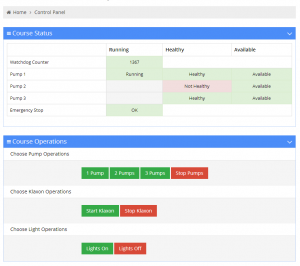
The full flow of the development will commence with a web based booking system provided by dotUK, end user bookings are then pushed privately to the Glasgow Watersports site where the onsite infrastructure will allow users to access their booking and the control systems via any wifi enabled device.
Local users can then control the pump output (strength of water flow) on demand in accordance with the abilities and expectations of their group.
A full remit of expected industrial safety, and health and safety best practices are of course in place but this investment allows the end user, through dotUK’s software development expertise, to bring control and a more beneficial user experience to the end user.
Release 1.0 of XyrohLib,
Release 1.0 of XyrohLib, our multi platform C# interface to a number of common crash reporting and logging services;
– Log file recycles at 1MB or at a customisable int (bytes) value, eg
– Can get full log file path back from Lib
The case for ‘App Watcher’
App Watcher is a new service (actually that’s a fib, it’s been around more than 3 years, so that’s not a good start!), it’s a new ‘public’ service I offer that anyone can sign up to. So who is it for, what does it do, and what do you get for your £25.00 a month.
So who is it for? Anyone who has a website, eCommerce store, cloud app, mobile app backend or any other publicly available web based endpoint – so that’s all of us then! More importantly this should be something you depend upon, a revenue stream or application without which your business will struggle to operate. Within that it’s geared more towards the SME sector who don’t have dedicated, fully skilled IT and developer support on hand 24/7 – that combination is where App Watcher is of value.

What does it do? Well on it’s own it merely monitors, it checks periodically to make sure that the monitored web service is up and responding – and then let’s you know if anything looks amiss – normally by email and / or SMS. Additionally we also keep an eye on the related domain name and any attached SSL Certificate to warn you when they are likely to expire so you can mitigate downtime before it happens – however none of that is particularly new, if all you want is monitors and alerts then there are great services already out there such as Pingdom for one that will look after.
So our justification, is the worst case scenario, we offer peace of mind that there will be real, dedicated, independent human support available – and already investigating – should your monitored web site, app or presence go down unexpectedly. As soon as is practical we will manually investigate, diagnose, and provide a report back letting you know exactly where the problem lies, and give you and indication as to who to speak to to get it resolved – and remain accessible until it’s back.
Consider the scenario, you’ve commissioned an e-commerce store a few years back, they person on staff familiar with the details is has since left, but the store is up and running, earning you money, and all is good – until the day it stops. What’s wrong, and how do you fix it?
- Has the domain name expired? Ex employee registered a few domains – always good to keep control of your domains and not leave it to the hosting company, but who did he register them with? Have we paid the bill.
- Who is it hosted with, possibly the developer you originally contracted, but you don’t have much to deal with her now as the site is all done, and chances are she set that up with a third party anyway, or even a reseller – will they act on out instructions, or was the hosting with the domain name company?
- Or could it be the SSL Cert, vague memory of our IT firm setting something up, or was that for the mail server – I forget.
- Where to start, and who do you trust, no one likes admitting an error so are the answers you’re getting back ones you can trust?

This is where we come in, we’re independent so no vested interest in anything other than being truthful and honest. We also have years of experience, we know where to look, what to test, and how to come to a quick, accurate conclusion – and more importantly communicate that to you in ways that are useful, relevant, and helpful to pointing you in the direction of the resolution to your woes.
We’ll also provide you with a written report to use for your records, or to forward on upstream to any interested parties to help you bypass their first line support and give hard facts to the engineers that can resolve it, after all we’ve done the detective work for them.
All that, an insurance if you will, from just £25.00 per month, and no risk to you as no minimum term, you can cancel when you wish. To signup our see the options just head over to our signup page to get started or if you have any questions just drop us a message via [email protected].
Look forward to having you onboard.
What Is a PHP File?
What Is a PHP File? – Original article at Tutsplus
PHP is a server-side scripting language which is mostly used to build web-based applications. These may range from a very simple blog website to a full-fledged eCommerce website for selling products online. In fact, PHP is one of the most popular server-side scripting languages, with a very healthy market share.
For those that like to geek out, or just understand what’s going on under the scenes, the above link is a really good breakdown on how PHP (the server aside scripting language I use for a lot of my development projects) work.
Andy Flisher is a Web Developer based in the North East of England with over 20 years software development experience. He is available for hire and specialises in cross platform mobile app development, web applications, desktop software, bespoke cloud architecture solutions and providing outsourced project management services.
Arcus Platform version 3.0 updates
Busy start to 2020 for the Askaris Arcus platform, big version 3.0 release translating both the portal and offline tablet interfaces into the end users native language, which will be huge for our client’s Brazilian, Norwegian and other global Operations.
Up next will be a multi-year improvement to the Dropped Object inspection framework, and further translation improvements – including a self learning multi language translation process – this will allow reports to be carried out in a a native language and then proof read and translated into multiple additional languages – another huge time saver.
The Arcus platform is used predominantly in the OIl and Gas sector to facilitate audited regulatory inspections, but as a full Asset Management suite it has uses in many other sectors.
#assetmanagement #inspectionsoftware #askaris #arcus
Find out more at – https://askaris.com/
Jacksons Law Livetrack – Case Management
Prior to Xyroh, Andy was the founder of dotUK (A software development firm based out of Yarm and Stockton on Tees here in the North East), again specialising as a developer in mobile apps, web applications and desktop software for a number of business clients – this is one of those portfolio case studies
Summary
Jacksons Law is a major North East law firm that advises both commercial and private clients and practices across all core areas of law. Their need was for a central information management portal that they could use to update and share information securely with clients with regards the progress of cases
Technical
Client Jacksons Law LLP – Major North East based Law Firm
Platforms Web
Technologies PHP, CSS, JQuery, Javascript, MySQL, Document Management
Development Web Development
Case Study
Jacksons Law practice law in a wide variety of practice areas and as such the individual needs, or specialisations of case management in one practice area can differ widely from those of another. In addition Jacksons have a wide variety of clients all of whom have a range of individual case and account reporting expectations, the challenge for dotUK was to present a solution that could encompass all needs, yet remain simple and manageable.
With Jacksons operating out of multiple sites, and to alleviate information security issues of allowing external users into their infrastructure it was decided that a web based system would be the most cost effective and simplistic to deploy and mange. In addition it would allow us to operate a mobile optimised interface for end client users that operate on site and on the road.
The system was built with a concept of case ‘Systems’ where a System mapped generally to a specific area of legal practise, eg Personal Injury, Conveyancing, Employment Law etc, in this way we could apply system specific modules to the cases within and
hence extend the specific functionality. This also allowed us to extend Systems for use by key clients, offering an enhanced branding experience for key client end users, enhanced and client specific reports and metrics, and internally SLA highlighting to ensure contractual targets were met.
The overall concept was however kept simple, allowing Jacksons staff to create cases within their permitted systems, allocating cases to end clients and updating cases with notes, attach documents, and report key milestones. In addition modules that allowed the client to keep track of running costs, and report on costs on a cost centre basis were created. External access is managed fully by Jacksons, with a hierarchy of client user permissions that allow data access to be restricted in a granular manner to department heads or end users as required.
The system is accessed over SSL as an industry standard, and is hosted on dotUK’s own Cloud hosting infrastructure here in the North East that allows use to offer high availability, fault tolerance, non interruptive snapshot backups and clustering options based on the clients requirements.
For more information, or to discuss case management or end user self service solutions tailored to your industry requirements please don’t hesitate to contact us for a consultation.
IPL – Quote Management and CRM System Case Study
Prior to Xyroh, Andy was the founder of dotUK (A software development firm based out of Yarm and Stockton on Tees here in the North East), again specialising as a developer in mobile apps, web applications and desktop software for a number of business clients – this is one of those portfolio case studies
Summary
International Procurement, a Stockton on Tees (North East) based supplier of severe service isolation solutions, needed a means to better automate and streamline their already complex request, quote, supply and invoicing workflow,
Technical
Client International Procurement – Critical & Severe Service Isolation Solutions
Platforms Web, Web Services, Kashflow
Technologies PHP, CSS, JQuery, Javascript, MySQL, REST API, JSON, Kashflow, SOAP
Development Web Development, Web Services Integration, Kashflow Integration
Case Study
The IPL sales process workflow is complicated by the very precise specification and requirements attached to each and every order, often a customer enquiry for a product will be met with a variety of options from a supplier, may have to meet complex supply requirements (including lengthy import, export and trade embargos), and even build to order solutions.
With that in mind, dotUK built, upon their in-house web services framework, a cloud based software solution that runs in the web browser, and is accessible both internally, to allowed users on the road or in home working environments, and to mobile and smartphone devices over the web, bespoke to IPL’s requirements.
The summary workflow required was in essence;
• Record Enquiry
• Manage Supplier requests (with quote and attached document management) to fulfil the enquiry
• Freeform Quote Generation (Multiple Quotes and Variations)
• Quote to Order process
• Supplier Purchase Order generation to fulfil the client order
• Invoice generation, and customer management to the web based Kashflow accounts software
Where document generation was required we standardised on PDF as a consistent, non-editable output format, and the system automatically maintains copies of the last generated version (eg for quotes), and also maintains an archived history of prior versions. The system also allows for management of archived records, repeat ordering, and reporting on sales and overdue enquiries.
The Kashflow accounts software integration, also web based, through it’s own SOAP based API meant that simple requests such as pushing invoices into their accounts software moved from being a one line requirement, with traditionally a costly, time consuming and frustrating integration phase, became as simple as it should be. A custom written Kashflow module was written as an extension to our web services framework that integrated seamlessly, and allowed us to continue using the same methods for data exchange and document generation. Something that wouldn’t have been possible with traditional desktop based accountancy packages
Christmas Cards for Schools Clustered Print Generation
Prior to Xyroh, Andy was the founder of dotUK (A software development firm based out of Yarm and Stockton on Tees here in the North East), again specialising as a developer in mobile apps, web applications and desktop software for a number of business clients – this is one of those portfolio case studies
Summary
Christmas Cards for Schools based in Middlesbrough here in the North East, part of Fundraising Creations, offer Fundraising solutions for Schools, their primary product being the production of bespoke printed and customised Christmas Card packs personalised with the pupils name, class and of course their own drawing. Having been responsible for the production of in excess of 1.1 million cards in the Christmas 2013 season efficiency and scalability are high priorities
Technical
Client Christmas Cards for Schools Ltd – Middlesbrough based School Fundraising
Platforms Linux, Web, WebServices,
Technologies PHP, Perl, CSS, Jquery, MySQL, REST, ImageMagick, Apache, Clustering
Development Web Development, Web Services Integration, Synchronisation
Case Study
To understand the scale and requirements to create, print and distribute in excess of 1million Christmas Cards in a 3 month period each year it’s probably beneficial to understand the workflow required, and the stages at which dotUK have been able to build out and scale, thus adding capacity each year.
• Participating Schools are sent Artwork kits
• Kits are returned and the drawings are scanned, grouped, and filed into our Web Based storage system
• School batches are processed within our processing cluster leading to the creation of digital print ready personalised images (1 Per child)
• Print ready images are synchronised to the print partner who takes responsibility for print and distribution, feeding back status to the storage system dashboard.
Due to the system being highly seasonal dotUK have built a bespoke hosting infrastructure that offers a cost effective, but highly scalable hosting solution. Services that are required year around are separated from the seasonal processing cluster, thus offering a base line cost for the majority of the year. The processing cluster is build in such a manner, that additional processing nodes can be added at 15minute deployment windows, and will automatically join in the pool of processing power, but can be removed when surplus thus reducing hosting and running costs that are unwarranted.
To maintain maximum data integrity, control, and compliance in excess of UK Data Protection requirements, the hosting cluster and processing engine is a bespoke, privately hosted solution provided, hosted, and monitored by dotUK
Depending on the solution offered to the school the workflow may include digital samples that are offered initially to the school prior to order, but ultimately school co-ordinators enter their school order quantities online through their own access portal, which triggers the print cluster and sync services to push final orders to the print partner.
In addition to the core card generation workflow, we also generate supplementary personalised products, and fully automate other ancillary services such as billing, marketing / kit requests and the ability for parents to view online samples prior to order
Stockton’s Big Challenge Active Travel Portal – Case Study
Prior to Xyroh, Andy was the founder of dotUK (A software development firm based out of Yarm and Stockton on Tees here in the North East), again specialising as a developer in mobile apps, web applications and desktop software for a number of business clients – this is one of those portfolio case studies
Summary
Stockton’s Big Challenge is a web based community competition initially funded by Stockton on Tees Borough Council, NHS Stockton on Tees, the Big Lottery and Sustrans. The aim is to build awareness of Active travel and encourage a healthier lifestyle across Stockton by encouraging people to walk or cycle to work.
Technical
Client: Sustrans / Stockton Active Travel
Platforms: Web, Web Services,
Technologies: PHP, CSS, JQuery, Javascript, MySQL, Animation, Charting
Development: Web Development, Web Reporting, Jquery Animation
Case Study
Stockton’s Big Challenge was pitched as lottery funded concept aimed at encouraging local (Stockton on Tees Borough) Employees, and Employers alike to ditch the car and cycle or walk to work, in essence embrace ‘Active Travel’ and enjoy a fitter healthier lifestyle – all through the power of competitions


The competition premise was simple, each and every time you under took ‘Active Travel’ you logged in to the site, recorded the date, distance, time, and reason for travel. These journeys were then logged and your cumulative total displayed in terms of miles travelled, calories used, kg of fat burnt, kg of CO2 saved, and Parmo’s!
For those not local to Teesside the Parmo is a regional delicacy of note (http://en.wikipedia.org/w…) which through it’s ingredients of cheese, béchamel sauce, and being deep fried has a ridiculously high calorie count!
The Parmo Calculator was the welcomed challenge in the development as the concept was that we would allow site users to visualise their journey in terms of Parmo’s dropping to a plate, the shock factor being the tiny fraction of a Parmo that most journey’s equated to. We also made the calculator available as a stand alone tool that visitors could play with and drum up publicity. It worked, gaining the challenge and dotUK local coverage in local press, radio interviews, and even linked to and referenced by the Wikipedia article above.
The competition itself was broken down to allow businesses of different sizes to also compete by entering teams of employees (the cumulative score of their employees being totalled), as well as the individual completion. All user journeys, their ‘Parmo Counts’ and a dynamically generated report of miles walked / cycled over time was available in the individual users portfolios.
From an administration point of view, all aspect of the system were run form a secure web based control panel, this covers both user management, flagging ‘suspect’ journey logs, content management, and competition and winner management. The competitions were designed to be run time and time again between specific date ranges so we built tools that allow new competitions to be defined and journeys automatically entered between the relevant dates. Some winners prizes were also drawn at random so we created tools that allowed winners to be picker honestly.
When a competition is active the real-time statistics are published to both a widget on the home page and also to a dedicated live results page showing the scoreboard in terms of individuals and employers in the region. To further motivate year on year competition the historical archives of past competition results are permanently available and automatically generated.
Wrapped around the competition element of the site is the content management system. Near all content on the site it controlled through our own build web based content management system. Each page on the front end consists of one or more content blocks and the output content of those blocks is created by the administrator using the WYSIWG (What You See Is What You Get) editor.

This means that the administrator does not need to know, or have any real understanding of HTML or web scripting languages, they can simply type as if it were a regular word processor and format text style, colour, size and alignment with ease. In addition we created a web based media manager which allowed the simple upload of images to be embedded in the content thus allowing for the simple creation of visually rich, engaging content for their community.
Content wise these tools allowed them to manage 20+ pages of unique content instantly on demand, and engaging users beyond the competition. Content included local events, Bike maintenance tips, links to local resources and cycle path maps, the Sustrans Cycle network journey planner and much, much more.

